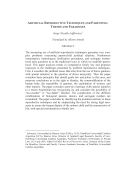Please use this identifier to cite or link to this item:
https://repositorio.uca.edu.ar/handle/123456789/3122| Título: | Artificial reproductive techniques and parenting : trends and paradoxes | Autor: | Lafferrière, Jorge Nicolás | Otros colaboradores: | University of Idaho. International Academy for the Study of the Jurisprudence of the Family | Palabras clave: | DERECHO DE FAMILIA; PATERNIDAD; RELACION PADRES-HIJOS; REPRODUCCION ASISTIDA; REPRODUCCION HUMANA; DONACION; GAMETOS; DONANTES; DERECHO A LA IDENTIDAD; LEGISLACION | Fecha de publicación: | 2011 | Editorial: | William S. Hein & Co., Inc. | Cita: | Lafferrière, J. N. (2011). Artificial reproductive techniques and parenting : trends and paradoxes [en línea] International Journal of the Jurisprudence of the Family 2. Disponible en: https://repositorio.uca.edu.ar/handle/123456789/3122 | Proyecto: | Bioderecho: Desafíos jurídicos para la persona humana planteados por la genética y las biotecnologías | Resumen: | Abstract: The increasing use of artificial reproductive techniques generates very complex problems concerning parent-child juridical relations. Posthumous insemination, heterologous fertilization procedures, and surrogate motherhood raise questions as to the traditional ways in which we establish parenthood. This paper analyzes trends in comparative family law and proposes responses to the challenges presented by artificial reproductive techniques. First, it considers the juridical issues that arise from the use of donor gametes, with special attention to the question of donor anonymity. Then the paper considers basic principles that should guide law and policy in this area, and proposes conclusions as to the right to identity, the commodification of the human body, the traceability of gametes, the exploitation of women, and other matters. The paper considers same-sex marriage (with special attention to a recent Argentinian law recognizing it), and considers the possibility of "two-mother" or "two-father" families. The complexities of the different combinations of biological parents, donors, and surrogate mothers are considered. The paper concludes by identifying the problems intrinsic to these reproductive techniques and by emphasizing the need for strong legal measures to assure the human dignity of the unborn child and the transmission of life, with special consideration to family law. | URI: | https://repositorio.uca.edu.ar/handle/123456789/3122 | ISSN: | 2165-7653 | Disciplina: | DERECHO | Derechos: | Acceso Abierto | Fuente: | International Journal of the Jurisprudence of the Family Vol. 2, 2011 |
| Appears in Collections: | Artículos |
Files in This Item:
| File | Description | Size | Format | |
|---|---|---|---|---|
| artificial-reproductive-techniques-lafferriere.pdf | 1,3 MB | Adobe PDF |  View/Open |
Page view(s)
89
checked on Apr 30, 2024
Download(s)
88
checked on Apr 30, 2024
Google ScholarTM
Check
This item is licensed under a Creative Commons License

